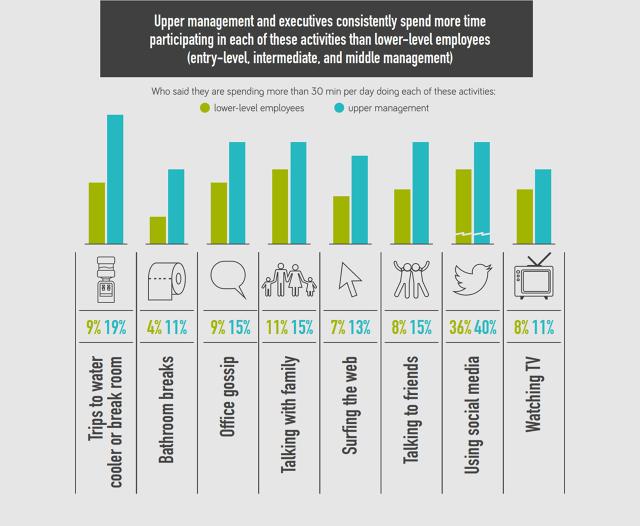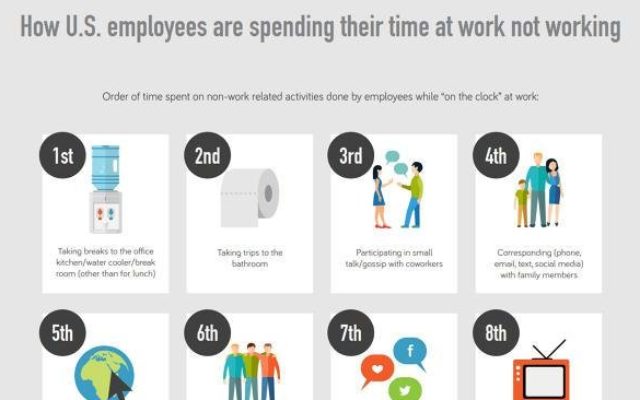If you look above, it’s not social media — which I bet most employers (as opposed to employees) would say. It’s actually water/coffee and bathroom breaks, which makes some sense: the former (hopefully not the latter) are ways to socialize with co-workers, and socialization/having friends at work is pretty important.
Here’s a couple of things I would add:
- E-Mail: This is theoretically work, but the way most people use it, it’s essentially a distraction.
- Meetings: Again, theoretically work, but almost no one uses meetings to actually move strategy forward.
- Conference Calls: Most people are using this as a chance to (a) eat or (b) catch up on e-mail.
- “Hey, got a second?” is a phrase that economically murders workplaces.
- Putting out fires: Ironically, they were often set by your boss.
While we’re on this boss topic, check out this graphic from the same article above:

As you can see here, it’s actually upper management — the big dogs — who slack off and do these things more.
All this research was done by some group called BambooHR, and because much of HR currently seems to think their job is to protect senior management (I was actually once told that by an HR person in a job I had), we have to get this rationalization paragraph about the research:
This may be due in part to the increase in responsibilities for upper level management. The heavier the workload, the more necessary it becomes to take solace in a quiet bathroom stall. But the pressure to perform has caused the work-life balance to shift. The BambooHR survey found more than half (56%) of employees say they try to make up for time spent on personal, non-work-related activities by working at home or in the office after standard work hours.
Might be time to get off the cross, because some other communities could use the wood.
If you want to know why senior leaders slack off more, here’s the simple answer:
- They can, and no one will call them on it.
If you think it’s because they’re so slammed and have to work at home, well, sure — maybe that’s true sometimes. In reality, that’s just Temple of Busy bullshit; it allows managers to use “I have such a high quantity of work!” as a replacement for “I’m good and productive at my job!” We love the quantity over quality argument, which interestingly contributes to how poorly most of us spend our time.
This is all standard ‘Let’s deify the executives and their slaying-dragons workloads!’ garbage. In reality, here’s the deal:
- If you’re high up a chain, you can mess around at work, not be productive, and typically not get called on it.
- That’s called hierarchy, and/or being close to the power vortex.
- Up there, relationships matter — and can fray, and you can be fired, yes — way more than deliverables and execution.
- If you’re lower on a chain, you better be f’n heads down and hitting targets, baby!
- This is, ironically, the same way e-mail works.
Thoughts?
My name’s Ted Bauer; I blog here regularly and you can learn about hiring me for freelance and contract gigs as well. You can also subscribe to my newsletter.
Article by channel:
Everything you need to know about Digital Transformation
The best articles, news and events direct to your inbox






